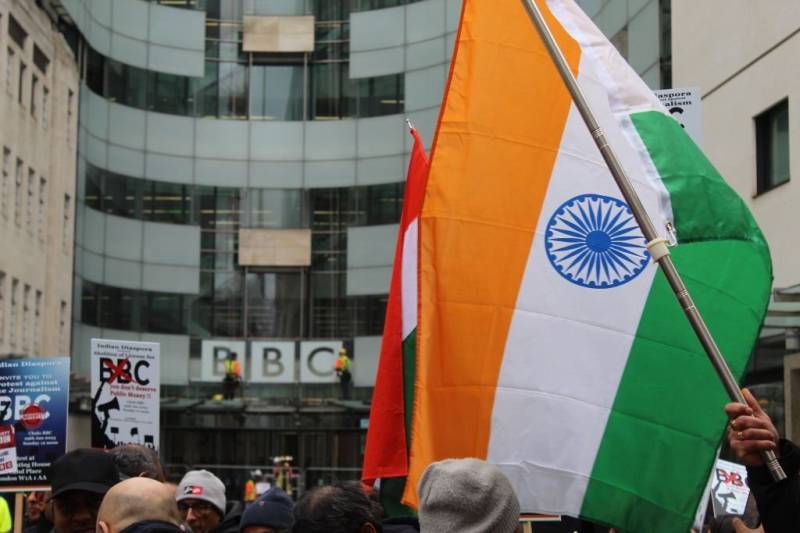
Income tax authorities of the Indian government raided the BBC‘s New Delhi and Mumbai offices on Tuesday, in apparent retaliation for the broadcaster airing a critical documentary on prime minister Narendra Modi’s actions during deadly sectarian riots in 2002.
Police sealed off the BBC's New Delhi office, and uniformed officials have been stationed outside to prevent people from entering or leaving.
https://twitter.com/IndicSociety/status/1625434541820112896
A BBC employee based in New Delhi said that the tax raid was in progress and that officials were “confiscating all phones”. Another BBC staffer in Mumbai confirmed that the British broadcaster’s office in India’s commercial capital was also being raided.
A government official at the scene in New Delhi, who declined to identify himself or his department, said there was “government procedure happening inside the office”.
India’s Income Tax Department has not officially commented on this incident so far.
The BBC said that it was "fully co-operating" with authorities. "We hope to have this situation resolved as soon as possible," a short statement said.
The general secretary of the opposition Congress party, KC Venugopal, said Tuesday's search "reeks of desperation and shows that the Modi government is scared of criticism". "We condemn these intimidation tactics in the harshest terms. This undemocratic and dictatorial attitude cannot go on any longer," he tweeted.
The Editors Guild of India also expressed its concerns at the Indian government's "survey operations" at the BBC Offices in New Delhi and Mumbai.
https://twitter.com/IndEditorsGuild/status/1625430213286043648
In January, the BBC aired a two-part documentary "The Modi Question" in which it presented the allegations that Hindu nationalist Modi, when he was chief minister of Gujarat state, ordered police to not intervene and let sectarian riots take place. The communal violence left at least 1,000 people dead, most of them Muslims.
India’s government blocked videos and tweets sharing links to the BBC documentary, using emergency powers under its information technology laws.
Kanchan Gupta, an adviser to the Modi government, slammed the documentary as “hostile propaganda and anti-India garbage”. Gaurav Bhatia, a spokesman from Modi's ruling Bharatiya Janata Party (BJP), has described the BBC as the "most corrupt organisation in the world".
Student groups organised viewings of the documentary despite campus bans, defying government efforts to stop it. In late January, police arrested two dozen students at the prestigious Delhi University to stop a screening there.
Police sealed off the BBC's New Delhi office, and uniformed officials have been stationed outside to prevent people from entering or leaving.
https://twitter.com/IndicSociety/status/1625434541820112896
A BBC employee based in New Delhi said that the tax raid was in progress and that officials were “confiscating all phones”. Another BBC staffer in Mumbai confirmed that the British broadcaster’s office in India’s commercial capital was also being raided.
A government official at the scene in New Delhi, who declined to identify himself or his department, said there was “government procedure happening inside the office”.
India’s Income Tax Department has not officially commented on this incident so far.
The BBC said that it was "fully co-operating" with authorities. "We hope to have this situation resolved as soon as possible," a short statement said.
The general secretary of the opposition Congress party, KC Venugopal, said Tuesday's search "reeks of desperation and shows that the Modi government is scared of criticism". "We condemn these intimidation tactics in the harshest terms. This undemocratic and dictatorial attitude cannot go on any longer," he tweeted.
The Editors Guild of India also expressed its concerns at the Indian government's "survey operations" at the BBC Offices in New Delhi and Mumbai.
https://twitter.com/IndEditorsGuild/status/1625430213286043648
In January, the BBC aired a two-part documentary "The Modi Question" in which it presented the allegations that Hindu nationalist Modi, when he was chief minister of Gujarat state, ordered police to not intervene and let sectarian riots take place. The communal violence left at least 1,000 people dead, most of them Muslims.
India’s government blocked videos and tweets sharing links to the BBC documentary, using emergency powers under its information technology laws.
Kanchan Gupta, an adviser to the Modi government, slammed the documentary as “hostile propaganda and anti-India garbage”. Gaurav Bhatia, a spokesman from Modi's ruling Bharatiya Janata Party (BJP), has described the BBC as the "most corrupt organisation in the world".
Student groups organised viewings of the documentary despite campus bans, defying government efforts to stop it. In late January, police arrested two dozen students at the prestigious Delhi University to stop a screening there.

